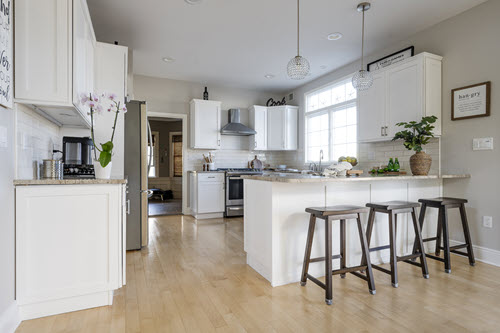Repainting your kitchen cabinets sounds simple in theory. However, before you even pick up a paintbrush, you need to take some critical steps. One of them involves sanding.
Yet, when you ask professional painters about whether you need to sand or not, you’ll get different answers. Some cabinet painting pros say yes, while others believe you can skip this step.
So, when it comes to sanding before repainting, is it really necessary? To help you get the results you want and come to a decision, here’s a look at both sides.
Why Sanding Makes Sense When Repainting Kitchen Cabinets
When you want to repaint your kitchen cabinets, sanding is generally recommended. Skipping it might save a little time during the process, but it could impact the look and durability of the final result. Why? Here are several reasons why sanding before repainting your kitchen cabinets makes sense.
Primer and Paint Can Better Adhere to the Surface
When you lightly sand your cabinets before repainting them, it roughens up the surface of the cabinets and opens up the pores of the wood. This preps them for the primer, allowing it to adhere better to the cabinet’s surface and preventing bleed-through of the previous color.
In addition, it’s also important to sand between each layer of primer and paint. Again, this requires more time and effort, but doing so allows for better coverage and adhesion of the primer and paint product. This means longer-lasting, more durable results that will withstand a busy kitchen environment and excessive wear and tear.
Sanding Creates a Smoother Surface on Your Cabinets
Another reason to sand before repainting your kitchen cabinets? It results in a smoother finish. If you have nicks and chips on the surface, sanding will smooth them out. When you repaint your kitchen cabinets, you won’t see these imperfections. If you have more extensive damage, use some wood filler to fill in cracks or uneven areas before sanding.
Sanding Also Removes the Previous Paint Sheen
Finally, sanding your cabinets before repainting them removes some of the previous paint sheen. This creates a surface that is best prepped for primer and paint. It will also improve the evenness and color of your newly painted cabinets.
So, Why Skip Sanding Before Repainting?
While many professionals will recommend sanding before repainting your kitchen cabinets, some suggest avoiding it. Why? Because aggressive sanding can wear the wood down and create the potential for moisture to seep in. This, in turn, damages the wood and puts it at risk, making spills and splatters more concerning.
However, this is generally only a problem when you use the wrong grit sandpaper and sand too aggressively. You don’t need coarse sandpaper that can damage edges or lead to gouges and scratches.
Instead, use a 100- or 150-grit sandpaper to roughen up the surface of the cabinets. You can also use a block sander for more control over the job. Sand in a back-and-forth motion, moving in the direction of the wood until you’ve sanded the entire surface.
If your cabinets are in good shape and there aren’t any nicks or scratches to repair, you can consider using liquid sandpaper, also known as a deglosser, as opposed to sanding. This product won’t smooth out uneven surfaces like sandpaper does, but it will roughen up the existing surface, remove the gloss, and better prepare the cabinet surface for paint.
Another reason to use liquid sandpaper? It can be especially helpful in corners and hard-to-reach areas on cabinets where it’s difficult to sand. If you do use liquid sandpaper, just make sure you are working in a highly ventilated area since this product contains harsh chemicals that are flammable.
Even if you use liquid sandpaper before repainting, it’s still important to sand in between each coat of primer and paint. Whether you want modern cabinets, rustic ones, or a more traditional vibe, this will help to achieve the most resilient results.
Want to skip the sanding and guesswork altogether? Put your kitchen cabinet repainting work into the hands of the professionals at N-Hance®. Call today at (855) 642-6230 for a FREE consultation and price quote.


